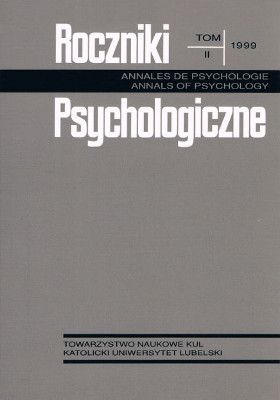Results of Learning as Conditioned by the Qualities of Temperament
Abstract
The relationship between the qualities of temperament and the results of learning were studied in the course of an experiment. The qualities of temperament were determined by means of the Strelau Temperament Questionnaire. The results of learning were examined on the basis of the following three tasks: writing words using conventional signs, solving logical problems and memorizing texts. School grades were also taken into consideration.
The reaults of the research show that there is a significant correlation between the temperament qualities, solving problems in the correct way and school grades. The students characterized by lower reactivity and higher mobility achieved significantly higher results in all three tasks. Their grades were also better. The students characterized by high reactivity, contrary to those showing low reactivity, made significantly more mistakes in the three tasks. The students who were more mobile, compared with the slower ones, made significantly more mistakes while writing words using conventional signs and presenting memorized texts.
References
De Jong P. F., Das-Smaal E. A. (1995). Attention and intelligence: The validity of Star Counting Test. Journal of Educational Psychology, 1, 80-92.
Gaweł J. (1977). Ruchliwość zachowania a transfer uczenia się u dzieci w wieku przedszkolnym (mps pracy magisterskiej, WSP, Olsztyn).
Goryńska E. (1982). Podstawowe cechy charakterystyki czasowej, zachowania i ich pomiar metodą Kwestionariusza. W: J. Strelau (red.), Regulacyjne funkcje temperamentu. Wrocław–Warszawa: Ossolineum, s. 183-203.
Goryńska E., Strelau J. (1979). Basic traits of the temporal characteristics of behavior and their measurment by an inventory technique. Polish Psychological Bulletin, 10, 199-207.
Helstrup T. (1993). Actions, contexts, memory – what is the relation? Scandinavian Journal of Psychology, 34, 19-26.
Jagodzińska M. (1981). Kodowanie pamięciowe. Przegląd zagadnień i wyników badań. Psychologia Wychowawcza, 5, 560-574.
Kagan D. M., Douthat J. M. (1985). Personality and learning FORTRAN. Man-Machine Studies, 22, 395-402.
Lerner J. V., Lerner R. M., Zabski S. (1985). Temperament elementary school childrens actual rated academic performance a test of a goodness of fit model. Journal Child Psychology and Psychiatry, 26, 1, 125-136.
Lewowicki T. (1975). Psychologiczne różnice indywidualne a osiągnięcia uczniów. Warszawa: WSiP.
Lindsay P. H., Norman D. A. (1984). Procesy przetwarzania informacji u człowieka. Warszawa: PWN.
Mevarech Z. R. (1985). The relationships between characteristics, intelligence, task-engagement and matematics achievement. The British Journal of Educational Psychology, 55, 156-163.
Nosal S. (1990). Psychologiczne modele umysłu. Warszawa: PWN.
Nosarzewski J. (1981). Efekty odtwarzania zapamiętywanych treści tekstu a wiek badanych. Olsztyn: WSP. Prace Pedagogiczne, s. 43-55.
Nosarzewski J. (1982). Metody zapamiętywania treści tekstu a wiek życia. Olsztyn: ODN. Zeszyt Pedagogiczny, s. 109-117.
Nosarzewski J. (1996). Psychologiczne różnice indywidualne a transfer. Olsztyn: WSP.
Nowak Z. (1970). Po rozum do głowy. Warszawa: Wydawnictwo Harcerskie.
Okoń W. (1987). Nauczanie problemowe we współczesnej szkole. Warszawa: WSiP.
Pawłow I. P. (1952). Dwadzieścia lat badań wyższej czynności nerwowej (zachowania się zwierząt). Warszawa: PIWZ.
Reich Z. (1979). Wpływ reaktywności na wyniki uczenia się i transfer (mps pracy magisterskiej, WSP, Olsztyn).
Riding R. J., Banner G. E. (1986). Sex and personality differences in second language performance in secondary school pupils. The British Journal of Educational Psychology, 56, 366-370.
Riding R. J., Cowley J. (1986). Extraversion and sex differences in reading performance in eight year old children. The British Journal of Educational Psychology, 56, 88-94.
Scribner S., Beach K. (1993). An activity theory approach to memory. Applied Cognitive Psychology, 7, 185-190.
Shnell J. (1986). Cognitive conceptions of learning. Review of Educational Research, Winter, 4, 411-436.
Strelau J. (1969). Temperament i typ układu nerwowego. Warszawa: PWN.
Witoszek A. (1967). Analiza porównawcza metod badania zapamiętywania tekstów. Studia Psychologiczne, 8, 71-121.
Włodarski Z. (1998). Psychologia uczenia się, t. 1. Warszawa: PWN.
Copyright (c) 1999 Roczniki Psychologiczne

This work is licensed under a Creative Commons Attribution-NonCommercial-NoDerivatives 4.0 International License.


